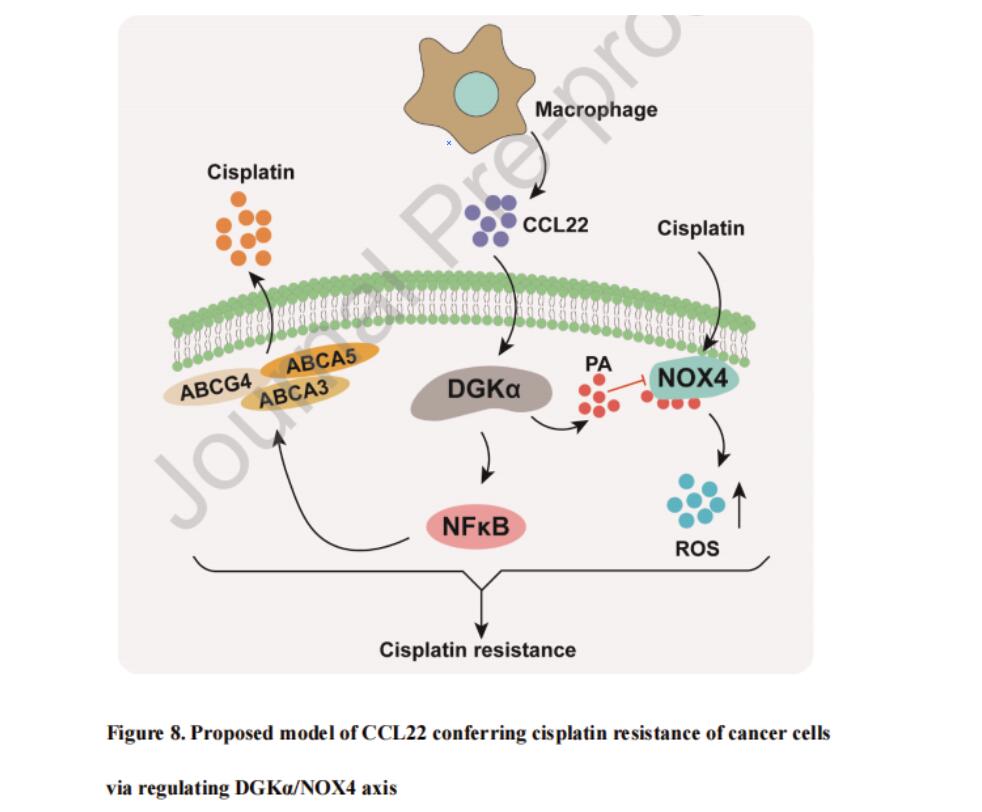Tumor-associated macrophage (TAM)-secreted CCL22 confers cisplatin resistance of esophageal squamous cell carcinoma (ESCC) cells via regulating the activity of diacylglycerol kinase α (DGKα)/NOX4 axis
 Tumor-associated macrophages (TAMs) are often associated with chemoresistance and resultant poor clinical outcome in solid tumors. Here, we demonstrated that TAMs-released chemokine-C-C motif chemokine 22 (CCL22) in esophageal squamous cell carcinoma (ESCC) stroma was tightly correlated with the chemoresistance of ESCC patients. TAMs-secreted CCL22 was able to block the growth inhibitory and apoptosis promoting effects of cisplatin on ESCC cells. Mechanistically, CCL22 stimulated intratumoral diacylglycerol kinase α (DGKα) to produce phosphatidic acid (PA), which suppressed the activity of NADPH oxidase 4 (NOX4) and then blocked the overproduction of intratumoral reactive species oxygen (ROS) induced by cisplatin. CCL22 activated DGKα/nuclear factor-κB (NF-κB) axis to upregulate the level of several members of ATP binding cassette (ABC) transporter superfamily, including ABC sub-family G member 4 (ABCG4), ABC sub-family A member 3 (ABCA3), and ABC sub-family A member 5 (ABCA5), to lower the intratumoral concentration of cisplatin. Consequently, these processes induced the cisplatin resistance in ESCC cells.
Tumor-associated macrophages (TAMs) are often associated with chemoresistance and resultant poor clinical outcome in solid tumors. Here, we demonstrated that TAMs-released chemokine-C-C motif chemokine 22 (CCL22) in esophageal squamous cell carcinoma (ESCC) stroma was tightly correlated with the chemoresistance of ESCC patients. TAMs-secreted CCL22 was able to block the growth inhibitory and apoptosis promoting effects of cisplatin on ESCC cells. Mechanistically, CCL22 stimulated intratumoral diacylglycerol kinase α (DGKα) to produce phosphatidic acid (PA), which suppressed the activity of NADPH oxidase 4 (NOX4) and then blocked the overproduction of intratumoral reactive species oxygen (ROS) induced by cisplatin. CCL22 activated DGKα/nuclear factor-κB (NF-κB) axis to upregulate the level of several members of ATP binding cassette (ABC) transporter superfamily, including ABC sub-family G member 4 (ABCG4), ABC sub-family A member 3 (ABCA3), and ABC sub-family A member 5 (ABCA5), to lower the intratumoral concentration of cisplatin. Consequently, these processes induced the cisplatin resistance in ESCC cells.




